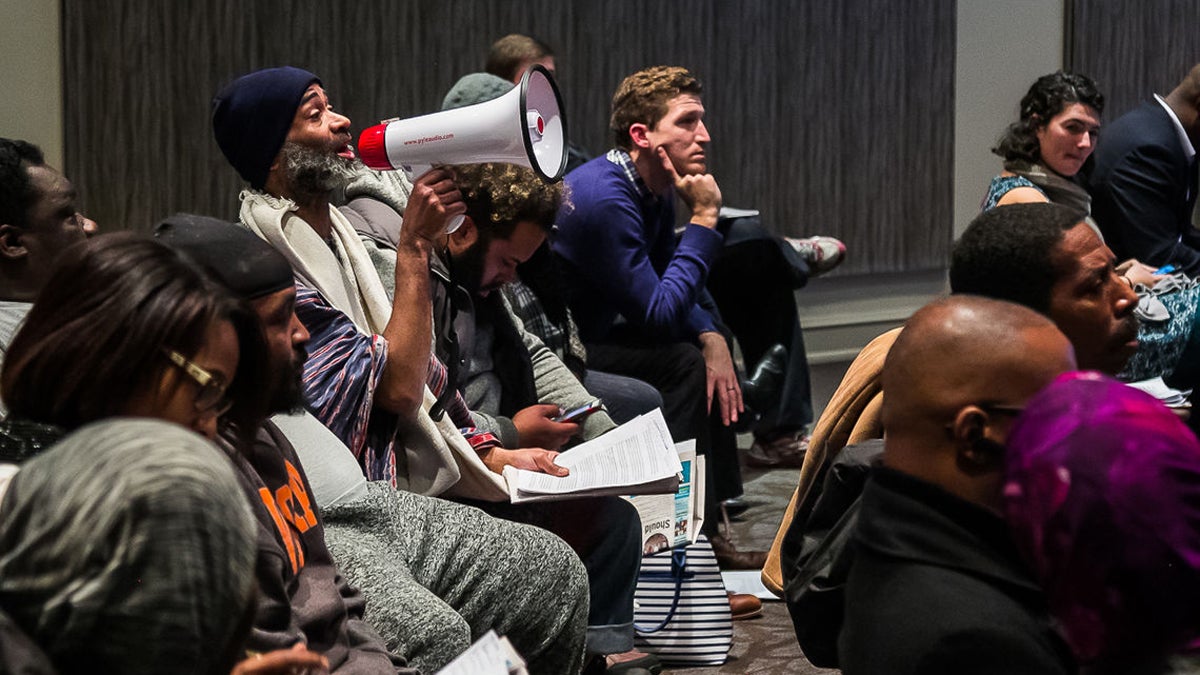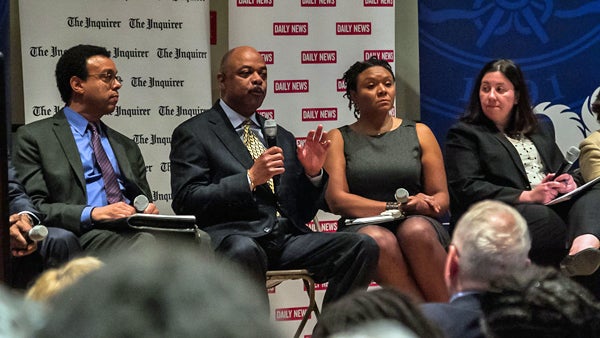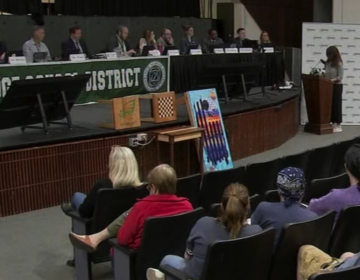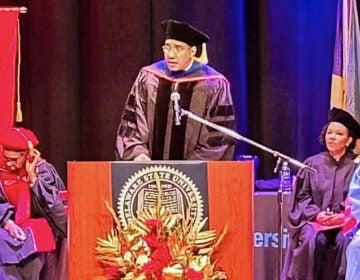Amid protests, panelists talk about replacing Philadelphia’s SRC

A protester disrupts the school governance forum calling on the District to improve poor conditions in public schools. (Darryl Murphy/The Notebook)
A well-attended forum on who should govern Philadelphia’s schools turned testy Thursday night as parent activists repeatedly disrupted the proceedings to protest poor conditions in city schools.
The conversation laid bare just how thorny the issue of school governance is in Pennsylvania’s largest city, and the protests reminded all that even if Philadelphians can agree on a governance structure there are still big issues looming in public education.
The forum, co-hosted by the Philadelphia Public School Notebook, Philadelphia Media Network, and Drexel University, was billed as a conversation on who should run Philadelphia’s public schools. Since 2001, the city system has been overseen by the School Reform Commission, a five-person body whose membership consists of three gubernatorial appointees and two mayoral appointees.
 (From left) Former SRC Chair Wendell Pritchett, PFT President Jerry Jordan, Parents United for Public Education member Robin Roberts, and Sarah Galbally, from Pa. Gov. Tom Wolf’s office, were among six panelists who discussed school governance at Drexel University on Thursday. (Darryl Murphy/The Notebook)The SRC emerged out of a political compromise between the city and the state when Philly schools were on the brink of financial calamity. But in the years since, the SRC has become a frequent scapegoat for the city’s educational shortcomings, all the while drawing ire for its lack of direct accountability.
(From left) Former SRC Chair Wendell Pritchett, PFT President Jerry Jordan, Parents United for Public Education member Robin Roberts, and Sarah Galbally, from Pa. Gov. Tom Wolf’s office, were among six panelists who discussed school governance at Drexel University on Thursday. (Darryl Murphy/The Notebook)The SRC emerged out of a political compromise between the city and the state when Philly schools were on the brink of financial calamity. But in the years since, the SRC has become a frequent scapegoat for the city’s educational shortcomings, all the while drawing ire for its lack of direct accountability.
All six forum members — City Council President Darrell Clarke, former SRC chair Wendell Pritchett, teachers union head Jerry Jordan, parent Robin Roberts, Public Citizens for Children and Youth executive director Donna Cooper, and Sarah Galbally from Gov. Tom Wolf’s office — all agreed that the SRC should be dissolved in favor of a locally-controlled body. That’s hardly a controversial position these days in Philadelphia.
“From my perspective, the SRC cannot go away soon enough,” Clarke said to audience applause.
The debate gets a lot trickier, however, when discussing what should replace the SRC.
Clarke and Cooper argued for a local school board appointed by the mayor, but with council approval of nominees. Pritchett and Roberts called for an elected board, much like the kind found in most school districts across the country. They also said the elected board should have taxing authority. At the moment, Philadelphia schools can’t raise their own revenue and must rely on the city, state, and federal governments for money.
“That local school board must come with some sort of revenue gathering ability,” said Roberts. “It is not going to be worth it if we have an election and we have no dollars.”
Jordan said his members favored some sort of blend between an appointed and elected school board.
Even if there was some consensus how to run the city’s public schools, the panelists didn’t all seem to think a governance change would by itself address unerlying problems.
“I do think the question of governance is a bit of a diversion from what the fundamental issues are that are making it difficult for us to deliver for every kid,” said Cooper.
That was precisely the point of the parent protesters who nearly derailed the forum. One parent with a bullhorn talked over the speakers while others shouted down panelists from the audience. The disruption lasted about five minutes, at one point causing a the forum organizers to take a hiatus.
The parents repeatedly shouted that the schools were failing their children and said quibbling over the SRC missed the larger point.
Allegra Simms, a parent at T.M. Pierce school in North Philadelphia and a member of the group Parent Leaders Advisory Network (PLAN), put it simply: “It doesn’t matter who runs the schools,” she said.
Other parents came as part of an organization called Educational Opportunities for Families (EOF), which advocates, among other things, for more school choice and charter expansion. The parents said the city should focus on replicating excellent district and charter options so that children aren’t stranded in failing schools. They said the SRC debate mattered little to them.
“Parents are not concerned with governance,” said Daniel Jean, an organizer with EOF. “It’s a huge distraction.”
Before the forum began, the audience heard a presentation from Dr. Kenneth Wong, a professor from Brown University who has studied how cities run their schools.
Wong laid out three basic forms of school governance.
The first and most common is a directly-elected school board. Typically such boards hold elections in off years to filter out the partisanship that spikes in even years. Elected school boards have the advantage of being directly accountable to local residents. There is, however, the threat that candidates will be at the mercy of campaign donors. Turnout also tends to be low in school board elections, which means the body doesn’t always reflect the will of the people.
Cooper with Public Citizens for Children and Youth said such a structure could be problematic in Philadelphia because most voters don’t have children in the school system and therefore might look out for their own pocketbooks first.
“The likelihood that they would be amenable to tax increases for the school district…is, I think, elusive,” said Cooper.
Wong also spoke about a highly-decentralized model where individual schools have considerable autonomy. He mentioned an experiment in Chicago where school-based boards had a high degree of authority over decisions such as the hiring and firing of principals. The downside, he said, was that Chicago found it hard to maintain active boards at each of its schools.
Finally Wong mentioned a mayoral control model. In that scenario city government plays the biggest role in school district decision making. There are, however, worries that a mayor who isn’t interested in education would neglect the school system — or that governance would become overly politicized. Wong did, however, mention that of all three options mayoral control seemed to produce the best overall outcomes.
The panelists also dug deep on the issue of money.
Former SRC chair Pritchett said it was crucial for the School District of Philadelphia to be able to levy taxes just like the other school districts in the state. He said that despite recent investments, Philadelphia’s city government gives a smaller share of its revenue to local schools than all but one of the nation’s ten largest cities. The state, meanwhile, is controlled by a Republican legislature that isn’t fond of tossing money into the Philly schools.
Clarke, however, pushed back. He said he opposed the idea of another body in the city that could tax people.
Cooper said she would prioritize pushing more money through the newly created state funding formula, which is designed to aid poor districts such as Philadelphia.
The funding conversation eventually bled into other financial issues that impact city schools. Phil Goldsmith, a former superintendent who wasn’t on the panel, but did give a talk on the history of school governance in Philadelphia, urged the city to collect more taxes or fees from higher-educational institutions and nonprofit hospitals. He also advocated ending tax abatements meant to drive redevelopment.
The cornocopia of topics raised served only to complicate what remains a vexing issue. And in the end there was really only one point of consensus: Whatever happens down the road, the SRC shouldn’t be a part of it.
“Communities control their own schools across the country,” said Pritchett. “It should be the exception when communities don’t control their own schools. And we certainly have the capacity to control our own schools.”
WHYY is your source for fact-based, in-depth journalism and information. As a nonprofit organization, we rely on financial support from readers like you. Please give today.





